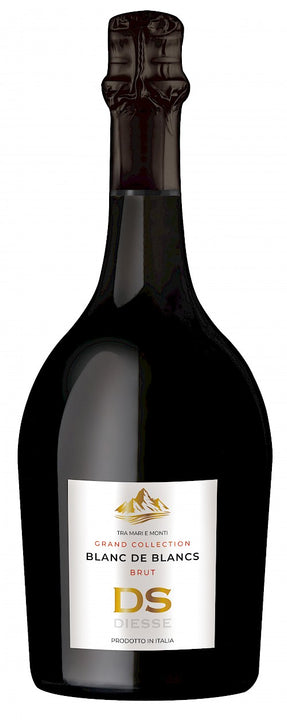DES02NVSP
Blanc de Blanc Brut
NV
Veneto
Organic Farming
Biodynamic farming
Wild yeasts
Low Sulphur
Vegan
Prosecco DOC / Prosecco DOCG is quickly becoming the most recognisable sparkling wine in the world, if not already the most produced. Made from the Glera grape and coming from 9 regions spanning the Northern Italian regions of Veneto and Friuli, it is the defacto go to sparkling wine. Unlike Champagne or Cava, Prosecco's second fermentation takes place in a steel tank (Charmat / Martinotti method) meaning it is comparatively cheaper, less complex and lighter. But with cheap production methods and off the chart exports many producers are trying reinstate Prosecco as a wine of quality, making them with ancient techniques (Col Fondo) or with greater complexity and tighter regulations (Prosecco Superiore DOCG).
The De Stefani family’s winemaking tradition began in 1624 in Refrontolo, a village in the Conegliano Valdobbiadene UNESCO World Heritage site. In 1866, Valeriano De Stefani identified the area's unique terroir, a vision continued by his son and daughter-in-law, Valeriano and Angelina. In 1958, third-generation Tiziano De Stefani, a graduate of Italy’s top oenology school, expanded into the Piave Valley near Venice. This area, shaped by the Adriatic, the Dolomites and caranto soils (a blend of Alpine clay and minerals), gives the wines their distinctive character. Today, the estate is based in Fossalta di Piave. Now led by fourth-generation winemaker Alessandro De Stefani and his wife Chiara, the estate follows organic and biodynamic principles, cultivating old-vine native varieties like Marzemino and Raboso. Fermentation uses indigenous yeasts, and vinification is carried out without sulphites or preservatives—just a minimal amount of sulphur at bottling. The winery is carbon neutral and fully solar powered, with sustainability at its core.

Wine details
DES02NVSP
De Stefani
Blanc de Blanc Brut
NV
Veneto
Organic Farming
Biodynamic farming
Wild yeasts
Low Sulphur
Vegan
Prosecco DOC / Prosecco DOCG is quickly becoming the most recognisable sparkling wine in the world, if not already the most produced. Made from the Glera grape and coming from 9 regions spanning the Northern Italian regions of Veneto and Friuli, it is the defacto go to sparkling wine. Unlike Champagne or Cava, Prosecco's second fermentation takes place in a steel tank (Charmat / Martinotti method) meaning it is comparatively cheaper, less complex and lighter. But with cheap production methods and off the chart exports many producers are trying reinstate Prosecco as a wine of quality, making them with ancient techniques (Col Fondo) or with greater complexity and tighter regulations (Prosecco Superiore DOCG).
The De Stefani family’s winemaking tradition began in 1624 in Refrontolo, a village in the Conegliano Valdobbiadene UNESCO World Heritage site. In 1866, Valeriano De Stefani identified the area's unique terroir, a vision continued by his son and daughter-in-law, Valeriano and Angelina. In 1958, third-generation Tiziano De Stefani, a graduate of Italy’s top oenology school, expanded into the Piave Valley near Venice. This area, shaped by the Adriatic, the Dolomites and caranto soils (a blend of Alpine clay and minerals), gives the wines their distinctive character. Today, the estate is based in Fossalta di Piave. Now led by fourth-generation winemaker Alessandro De Stefani and his wife Chiara, the estate follows organic and biodynamic principles, cultivating old-vine native varieties like Marzemino and Raboso. Fermentation uses indigenous yeasts, and vinification is carried out without sulphites or preservatives—just a minimal amount of sulphur at bottling. The winery is carbon neutral and fully solar powered, with sustainability at its core.
